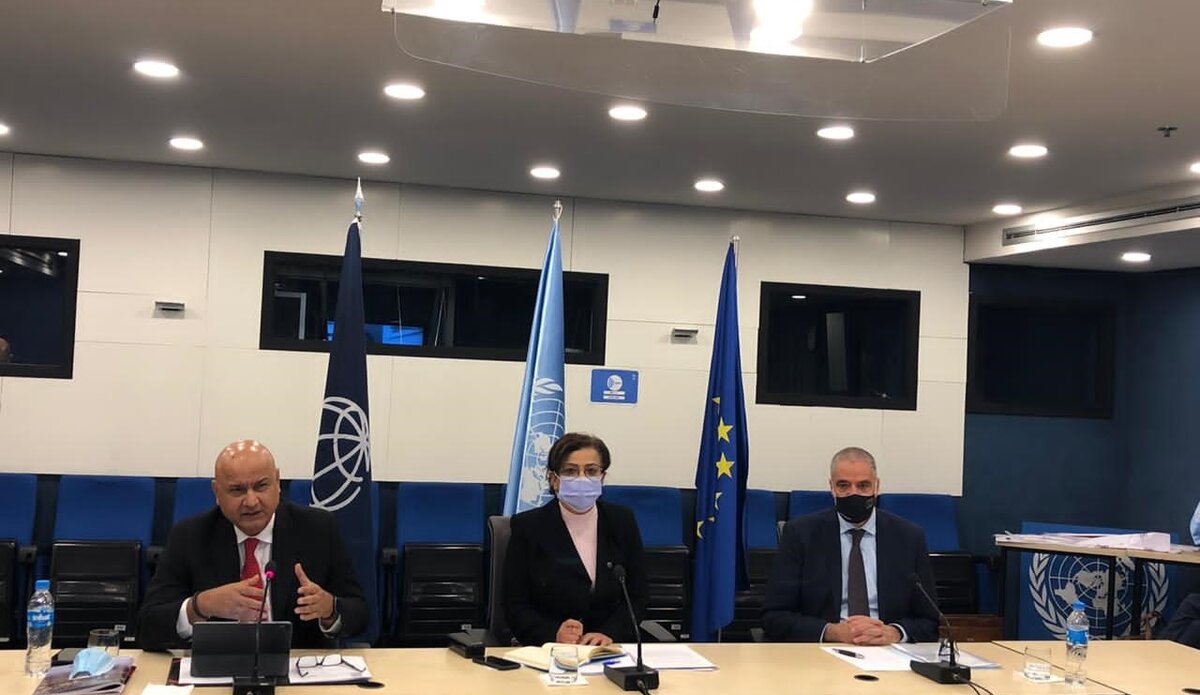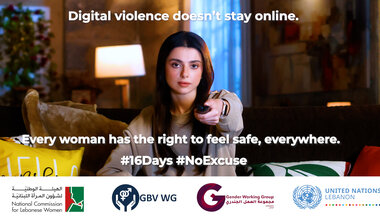EU, UN and WBG launch Reform, Recovery and Reconstruction Framework in response to Beirut Port Explosion
Four months after the tragic August 4 explosion that rocked the Port of Beirut, the European Union (EU), the United Nations (UN) and the World Bank Group (WBG) launched today, in a virtual press conference, a landmark ‘people-centered’ response plan to help Lebanon address the urgent needs of the affected population as well as tackle the related governance, recovery and reconstruction challenges.
The 18-month Lebanon Reform, Recovery and Reconstruction Framework (3RF) addresses the urgent needs of the population affected by the explosion that killed over 200 people, injured more than 6,500 and destroyed thousands of homes and properties in the capital city. This comprehensive response to the explosion bridges the immediate humanitarian assistance with medium-term recovery and reconstruction efforts, in order to put Lebanon on a path of sustainable development. It is also guided by the overarching principles of transparency, accountability, and inclusion.
The 3RF aims to achieve three central goals: (1) a people-centered recovery that addresses people’s basic needs, restores their livelihoods, improves social justice for all and ensures participatory decisionmaking; (2) the reconstruction of critical assets, services, and infrastructure that provides equal access to quality basic services for all and enables sustainable economic recovery; and (3) the implementation of reforms as an essential requirement to restore trust, support reconstruction and improve governance.
Speaking at the conference held at the UN House in Beirut were the Ambassador of the European Union to Lebanon, Ralph Tarraf, the UN Deputy Special Coordinator, Resident and Humanitarian Coordinator for Lebanon, Najat Rochdi, and the Regional Director of the Middle East Department of the World Bank, Saroj Kumar Jha.
Rochdi said that “the 3RF is fundamentally for the people, it is about meeting their critical needs, safeguarding their basic rights, giving them a voice and a place in policy making”. That’s why it adopted a participatory and inclusive approach that involved all key stakeholder groups, including civil society, from planning through implementation, she added. “The 3RF provides a vision for ‘Building Back Better’, a plan to prevent a full-scale humanitarian catastrophe.”
Tarraf underscored that re-gaining the trust of the Lebanese people in state institutions is imperative for a successful recovery and reconstruction. To that end, the government needs to assume responsibility and urgently adopt credible structural reforms, he said. “Lebanon needs a new governance model that
ensures that state institutions serve people’s needs and addresses the multiple crises the country faces,” he added.
The 3RF pursues two parallel tracks: (1) A socio-economic recovery track (“track 1”), that addresses the urgent needs of the most vulnerable populations and small businesses affected by the explosion; and (2) A reform and reconstruction track (“track 2”), focusing on critical reforms to address governance and recovery challenges in Lebanon, which are prerequisites for mobilizing international support for reconstruction beyond the recovery track.
“Channeling support directly to Lebanese people and businesses that have been impacted by the explosion is of utmost importance. To that effect, a Lebanon Financing Facility (LFF) will be set up to receive grant financing from donors for the implementation of the 3RF,” said Saroj Kumar Jha. “The LFF will focus on immediate recovery needs of poor and vulnerable households, support business recovery programs, promote inclusive ways of working with civil society and prepare the ground for reform and reconstruction. It will adopt flexible, non-governmental implementation modalities combined with strong fiduciary monitoring and independent oversight over the use of LFF funds,” he added.
With people at the heart of this response plan, the framework is structured around four strategic pillars: i) improving governance and accountability, ii) jobs and economic opportunities, iii) social protection, inclusion and culture, and iv) improving services and infrastructure. Each pillar identifies strategic objectives and priority areas across both the recovery and the reform and reconstruction tracks.
Going forward, the European Union, the United Nations and the World Bank Group remain committed to stand by the Lebanese people at all times and help them build back a better Lebanon.
الاتحاد الأوروبي والأمم المتحدة ومجموعة البنك الدولي يطلقون إطار الإصلاح والتعافي وإعادة الإعمار لمدة 18 شهراً استجابة للاحتياجات الناشئة عن انفجار مرفأ بيروت
بيروت، 4 كانون الأول 2020 – بعد مرور أربعة أشهر على الانفجار المأساوي الذي هزّ مرفأ بيروت، أطلق الاتحاد الأوروبي والأمم المتحدة ومجموعة البنك الدولي اليوم، خلال مؤتمر صحافي افتراضي، خطة استجابة ترتكز على مبدأ "الإنسان أولاً" لمساعدة لبنان على تلبية الحاجات الطارئة للمتضررين ومواجهة التحديات المرتبطة بالحوكمة والتعافي وإعادة الإعمار.
ويلبّي إطار الإصلاح والتعافي وإعادة الإعمار (3RF) الحاجات الطارئة للسكان المتضررين من الإنفجار الذي أودى بحياة أكثر من 200 شخص، وأدّى إلى جرح ما يزيد عن 6,500 آخرين وتدمير آلاف المنازل والممتلكات في العاصمة. وتربط الاستجابة الشاملة لمواجهة تداعيات الانفجار المساعدة الإنسانية الفورية بجهود التعافي وإعادة الإعمار في المدى المتوسط بهدف وضع لبنان على مسار التنمية المستدامة. كما ترتكز على المبادئ الشاملة للشفافية والمساءلة والشمولية.
إلى ذلك، يهدف الإطار المذكور إلى تحقيق ثلاثة أهداف مركزية: (1) تعافٍ محوره الناس يلبي احتياجاتهم الأساسية، ويعيد سبل عيشهم، ويحسّن العدالة الاجتماعية للجميع ويضمن نهجاً يقوم على المشاركة في صنع القرار؛
و(2) إعادة إعمار الأصول والخدمات والبنية التحتية الحيوية التي توفر للجميع إمكانية الحصول على الخدمات الأساسية على نحو متساوٍ وتمكين التعافي الاقتصادي المستدام؛ و(3) تنفيذ الإصلاحات كشرط أساسي لاستعادة الثقة ودعم إعادة الإعمار وتحسين الحوكمة.
وتحدث خلال المؤتمر الصحافي الذي عُقد في بيت الأمم المتحدة في بيروت كل من سفير الاتحاد الأوروبي في لبنان رالف طراف، ونائبة المنسق الخاص للأمم المتحدة في لبنان والمنسقة المقيمة ومنسقة الشؤون الإنسانية نجاة رشدي، والمدير الإقليمي لدائرة الشرق الأوسط في البنك الدولي ساروج كومار جها.
وشدّد السفير طراف على أنّ "استعادة ثقة الشعب اللبناني في مؤسسات الدولة أساسية لإنجاح عملية التعافي وإعادة الإعمار. لذلك، يتعين على الحكومة أن تتحمل مسؤوليتها وتعتمد بشكل ملح إصلاحات هيكلية موثوقة". وأضاف أن "لبنان بحاجة إلى نموذج حوكمة جديد يضمن توفير مؤسسات الدولة الاحتياجات الملحة للسكان ومواجهة الأزمات المتعددة التي تشهدها البلاد".
ويتبع إطار الإصلاح والتعافي وإعادة الإعمار مسارين متوازيين هما: (1) مسار تعافٍ اجتماعي واقتصادي ("المسار 1") الذي يلبي الاحتياجات الطارئة للسكان من الفئات الأكثر ضعفاً والمؤسسات الصغيرة المتأثرة بالإنفجار، و(2) مسار إصلاح وإعادة إعمار ("المسار 2") الذي يركز على الإصلاحات الأساسية لمواجهة تحديات الحوكمة والتعافي في لبنان، وهي شروط مسبقة لحشد الدعم الدولي لإعادة الإعمار بما يتجاوز مسار التعافي.
وأكد كومار جها على ضرورة "تقديم الدعم مباشرة للشعب والمؤسسات اللبنانية المتأثرة بالإنفجار، فهذا الأمر بالغ الأهمية. لذلك سوف يتم وضع آلية تمويل للبنان لتلقي الهبات من الجهات المانحة بهدف تنفيذ إطار الإصلاح والتعافي وإعادة الإعمار". وأضاف أن "الإطار سيركز على احتياجات التعافي الفورية للأسر الفقيرة والضعيفة، ودعم برامج تعافي الأعمال، وترويج طرق شاملة للعمل مع المجتمع المدني وإعداد الأرضية للإصلاح وإعادة الإعمار. وستعتمد آلية التمويل أنماط تنفيذ مرنة وغير حكومية، تعتمد على نظام قوي للرصد الإئتماني ورقابة مستقلة على كيفية استخدام الأموال".
ونظراً إلى تمحور خطة الاستجابة هذه حول مبدأ الإنسان أولاً، يقوم الإطار على أربع ركائز إستراتيجية:
1) تحسين الحوكمة والمساءلة، و2) الوظائف والفرص الاقتصادية، و3) الحماية الاجتماعية والإدماج والثقافة،
و4) تحسين الخدمات والبنية التحتية. وتحدد كل ركيزة الأهداف الإستراتيجية والمجالات ذات الأولوية عبر مساري التعافي والإصلاح وإعادة الإعمار.
ومستقبلاً، سوف يواصل كل من الاتحاد الأوروبي والأمم المتحدة ومجموعة البنك الدولي الالتزام بالوقوف إلى جانب الشعب اللبناني في جميع الظروف ومساعدته على إعادة إعمار لبنان نحو الأفضل.
***
Link to the Full 3RF Report: https://unscol.unmissions.org/sites/default/files/final_lebanon_3rf_repo...
 UN
UN





